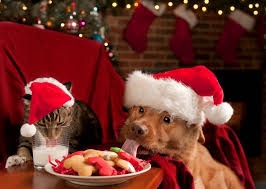With each new season we see a fresh list of hazards that pose a threat to our beloved pets. The winter brings some unique risks to be aware of that can be easily avoided to ensure a safe and happy holiday season.
Holiday Plants: There are a few plants that we see more commonly around the holidays that if ingested can be toxic. Holly can cause vomiting, diarrhea and depression. Mistletoe leaves or berries can cause vomiting, diarrhea, difficulty breathing, hallucinations, seizures and has the potential to be fatal. Pine Needles can cause oral irritation, vomiting, diarrhea, lethargy, tremors, and have the potential to puncture intestines. Poinsettia can cause irritation to the mouth, hypersalivation and in rare cases vomiting. If any of these holiday plants make an appearance in your home, be sure to keep them well out of reach for your pets; frequently clean the pine needle droppings from around your Christmas tree. Many cats may not be able to resist the urge to climb your Christmas tree, consider anchoring the tree from the top to prevent it from falling over.
Holiday foods: There are many tasty holiday treats that may entice our pets to beg or scrounge for leftovers. Rich fatty foods, salty foods, chocolate, alcohol and turkey bones seem to be in abundance over the holidays. All of these can cause serious problems if ingested by our pets. Rich, salty, and fatty foods can cause vomiting, diarrhea and pancreatitis (inflammation of the pancreas); alcohol can cause vomiting, diarrhea, disorientation, tremors and difficulty breathing. Chocolate, of course can be especially dangerous, symptoms to watch for if your dog has ingested chocolate are vomiting, diarrhea, lethargy, agitation, increased heart rate, increased thirst, and seizures. Turkey bones can splinter and break with risk of causing intestinal perforation, diarrhea or even blockage, which may require surgical intervention.
Decorations and Tinsel: Bright, shiny, dangling ornaments can be very appealing, especially for cats, however many decorations can be dangerous. Decorations come in all shapes and sizes; many have small pieces or are made of fragile materials. If ingested, these small pieces may get lodged in the intestines or can cause your pet to choke; sharp edges may cause lacerations in the mouth, throat or intestines. Tinsel can be especially dangerous if swallowed, becoming tangled in the intestines, if you do not want to forgo Tinsel this season, try limiting it to the top of your tree or in higher places where it can’t be reached.
Additional lights strung around the house means extra electrical cords, be sure to keep them out of reach and unplugged when your not at home. Chewing on live wires can cause burns, difficulty breathing, seizures and even cardiac arrest.
Salt and Antifreeze: Antifreeze contains ethylene glycol, which is very sweet tasting and therefore attractive to many animals. If ingested, antifreeze is extremely toxic, even the smallest amount can be lethal. Thoroughly clean up any spills or drips, store in a tightly closed container well away from any pets access. If you think your pet has ingested antifreeze contact your veterinarian right away.
Salt used to melt ice on sidewalks and roads can be very bothersome for our pets, irritating both skin and mouth. Signs of ingestion could include excessive drooling, depression, and vomiting. To avoid irritation, try rubbing baby oil on your pets pads before going for a walk, and clean their paws well after.
Holiday Excitement: The holiday season can be very exciting for many of us filled with parties and guests. If you are going to be hosting parties or having guests stay from out of town, ensure your pet has an area of the house or a room they can retire to if the hustle and bustle of the holiday season becomes overwhelming or stressful.
The holiday season can be a festive and joyful time for both you and your pet. To ensure you have a safe and healthy one, be aware of the potential hazards and take precautionary measures where able.

